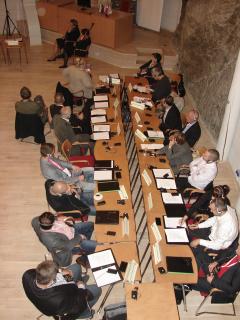
Carmit Lubanov, AEJI' director was nvited to participate in unique International conference on Energy Policy ferom Social perspective, Organized by RLS in East Europe and The Cal Union workers in Poland, Septrember 2014.
Introduction - When looking at the public discourse on energy, it is noticeable that the term energy economics, that was often used in past, is now often replaced with the term energy policy.
This fact, although it may seem insignificant, illustrates contemporary problems with obtaining resources and producing energy, which seem to be moving from the level of economy to the level of global politics. The question that remains open is what is the role of societies and social structures in the said process.
In the European Union energy economics and energy policy are decided upon on the national level. The only strategy on the community level seems to be the one dealing with climate protection, which focuses on lowering CO2 emission. This type of energy policy leads in practice to many paradoxes. Some states plan on shooting down nuclear power plants because of environmental protection, other because of similar reasons (climate protection) want to spend millions of Euros on building such plants. Countries that do not exploit natural resources because of environmental reasons, face a rapid growth of import, which does not lower the use of energy but only moves the exploitation and environment destruction point outside their borders.
For some time now, one of the main political goals has been energy safety, which each state works for independently. In this matter as well, states tend to implement very different strategies, in with environmental and climate protection seem to play a role not as significant as it may be expected from their declarations.
At the moment the fallowing questions accrue.
Is it really possible and sensible to create national and even wider (EU) energy policies that:
- Do not take into account or tend to downplay the economic and ecological situation of other states?
- Do not take into account the discourse on energy policy, that takes place on the level of the societies and their structures?
Energy economics and energy policy cannot remain the domain to the political elites, that claim to have the right knowledge and competence. Social actors also poses a great deal of knowledge and experience in this field.

